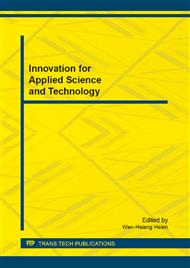[1]
Kennedy J., Eberhart R., "Particle swarm optimization," Proc. of IEEE Int. Conf. on Neural Networks, Perth, Australia, p.1942–1948, 1995.
Google Scholar
[2]
Solihin M.I., Akmeliawati W. and Akmeliawati R., "Self-Erecting Inverted Pendulum Employing PSO for Stabilizing and Tracking Controller," Proceedings of International Colloquium on Signal Processing & Its Applications (CSPA), Kuala Lumpur, Malaysia, p.63 – 68, 6-8 March, (2009)
DOI: 10.1109/cspa.2009.5069190
Google Scholar
[3]
Arimoto, S., Kawamura, S., & Miyazaki, F. (1984). Bettering operation of robots by learning. Journal of Robotic System, 1(2), 123_140.
DOI: 10.1002/rob.4620010203
Google Scholar
[4]
Middleton, R. H., Goodwin, G. C., & Longman, R. W. (1989). A method for improving the dynamic accuracy of a robot performing a repetitive task. International Journal of Robotic Research, 8(5), 67_74.
DOI: 10.1177/027836498900800506
Google Scholar
[5]
Elci, H., Longman, R. W., Phan, M. Q., Juang, J.-N., & Ugoletti, R. (2002). Simple learning control made practical by zero-phase filtering: Application to robotics. IEEE Transactions on Circuit and System I: Fundamental Theory and Applications, 49(6), 753_767.
DOI: 10.1109/tcsi.2002.1010031
Google Scholar
[6]
Jeong, G. M., & Choi, C. H. (2002). Iterative learning control for linear discrete time nonminimum phase systems. Automatica, 38(2), 287_291.
DOI: 10.1016/s0005-1098(01)00197-2
Google Scholar
[7]
Jang, H. S., & Longman, R. W. (1994). A new learning control law with monotonic decay of the tracking error norm. In Proceedings of the 32nd Allerton conference on communication, control, and computing (p. 314_323). Urbana, USA: University of Illinois.
Google Scholar
[8]
Jang, H. S., & Longman, R. W. (1996b). An update on a monotonic learning control law and some fuzzy logic learning gain adjustment techniques. Advances in Astronautical Sciences, 90, 301_318.
Google Scholar
[9]
Shi Y. and Eberhart R., " A modified Particle swarm optimizer," Proc. IEEE Int. Conf. Evol. Comput., Anchorage, AK, USA. P. 69-73, (May 1998).
Google Scholar
[10]
Zwe-Lee Gaing, "A particle swarm optimization approach for optimum design of PID controller in AVR system," IEEE Trans. Energy Convers., vol. 19, no. 2,p . 384–391, (June 2004)
DOI: 10.1109/tec.2003.821821
Google Scholar


